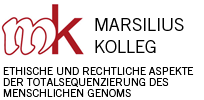Ethical and Legal Issues
The enormous strides made in the exploration of the human genome have given rise to new ethical and legal questions.
The immense impact that genetic information has had on the understanding of “sickness” and “health” has fundamentally altered the self-conception of humans and has triggered controversies about the responsible handling of new technological possibilities. Questions about the accuracy and significance of “genetic data” and risk profiles, the patterns of interpretation, the assignment of meaning or significance and the correlation of genetic information with other medically relevant data have arisen. These are closely tied to normative and cultural questions about the policies governing how and when these technologies should be used.
Both hopes and fears alike have been voiced in the public discussion. On the one hand, the understanding of the origins, diagnosis, treatment and prevention of diseases can be improved through the analysis of the human genome. In what is known as “personalized medicine,” individual dispositions to certain diseases or the individual metabolisation of medications can be analysed in order to determine the most effective treatments and preventative lifestyle changes. The use of medications is thus optimised, reducing the overall cost.
From the very beginning, however, genome research has also been accompanied by criticism and doubts. Many are wary of narrowly defining a person on the basis of their genome. They fear an increasing “objectification” of the patient or study subject that could potentially undermine the protection and security of human dignity. An additional worry is that genome research will result in genetic discrimination, for instance in the insurance system or in the working world. In the USA, a law has already been passed against genetic discrimination (the Genetic Information Nondiscrimination Act of 2008). The ability to determine predisposition to a disease before it has broken out has resulted in the emergence of a new type of individual, one that is neither “healthy” nor “ill.” The potential for discrimination and stigmatization increases with greater knowledge of an individual’s genetic profile. The fair and equitable application of the enormous amount of spending on this research has also been scrutinized.
A key normative principle in the field of medicine and bioethics as well as for the corresponding legal policy is the respect of patient and study subject autonomy. A critical element of the actual practice of this postulate is “informed consent.” This refers to the voluntary approval of the patient or subject after having been fully informed of the potential risks and results, which should allow for an independent decision. But how can a person be informed completely of all possible effects given the vast amounts of surplus information available as a result of whole genome sequencing and the fact that it is impossible to predict what new research and diagnosis opportunities will become available? In a field in which many questions in the basic research remain unanswered, is the concept of autonomy and informed consent still viable? An especially contentious issue is the linking of genetic data, tissue banks and individual patient information in recent research projects. How can the protection of privacy and confidentiality, an important provision of the autonomy principle, be ensured in a field in which a new form of “genetic transparency” exists and individuals’ information is stored in databases and tissue banks that are accessible to a large field of “users?” And how realistic is the protection offered by the “anonymisation” and “pseudonymisation” of data when the sequencing of even a very short strand of DNA, unique to a single individual, can identify its owner. These examples clearly indicate the immense ethical, legal and economic problems surrounding the introduction of new technologies. The German Ethics Council and the Leopoldina both addressed these issues in their position statements (2010) and called for further clarification.
Currently, the genome research taking place at the University Hospital, the EMBL and the DKFZ is operating under ethical and legal regulations oriented on the bioethical guidelines of the International Cancer Genome Consortiums (ICGC) and the guidelines of the National Center for Tumor Diseases (NCT), to which the tissue bank, under the auspices of the medical faculty and the DKFZ, belongs. In these and other existing regulations and guidelines, problems connected to the total sequencing of the human genome have only been partially addressed. The German Genetic Diagnosis Act that was enacted in February 2010 also does not adequately regulate the use of new technologies; in addition, for a variety of reasons it does not cover genetic studies and analyses or the handling of genetic trials and data for research purposes. EURAT will formulate a position on these issues and act in an advisory capacity.

